PRINCETON, NJ -- Earlier this month, a new report by U.S. intelligence indicated that Iran shut down its program to develop nuclear weapons in 2003 and would not be able to develop a nuclear weapon until at least 2009. But the White House and other foreign policy leaders have cautioned the public about thinking that Iran no longer poses a threat to the United States. And more recently, at the beginning of this week, the Iranian government received a shipment of uranium-enriched fuel rods that are to be used in Iran's first nuclear power plant. Construction has begun on a second nuclear power plant.
A recent ÆéûÜǨû§Panel poll finds more than 6 in 10 Americans saying Iran's nuclear program poses a serious threat to the United States, with one-third saying it poses a "very serious" threat. Since the release of the National Intelligence Estimate report, there has been little change in the belief that Iran is the single country that poses the greatest threat to world stability. The vast majority of Americans also believe the true purpose of Iran's nuclear program is to produce nuclear weapons rather than nuclear power.
Overall Results
The Dec. 10-13, 2007, poll updated a question from earlier this year that asks Americans to name, in their own words, the single country they consider to be the greatest threat to stability in the world. Iran continues to top the list, with 31% of Americans now saying it is the greatest threat to world stability. That compares with 35% who said this in October, before the information suggesting Iran is not an imminent nuclear threat was made public.
China is next, mentioned by 20%, followed by the United States, North Korea, Iraq, and Russia. These results are not much different from those measured in October.
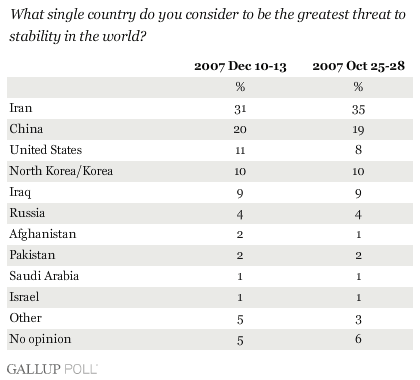
The public also believes that Iran's nuclear program poses a serious threat to the United States. According to the poll, 61% of Americans say the Iranian nuclear program poses a threat to the United States, with 33% saying it poses a "very serious" threat. Thirty-seven percent say Iran's nuclear program does not pose a threat to the United States.
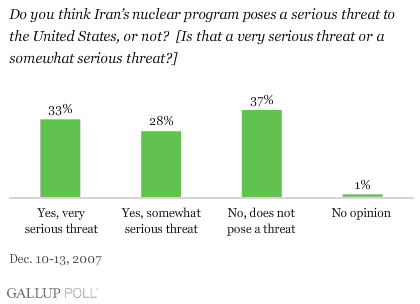
While the Iranian government acknowledges having a nuclear power program, the Bush administration maintains that this is only a cover for Iran's long-term goal of developing a nuclear weapons program. Americans tend to agree with the Bush administration and are skeptical of Iran's statements about its nuclear program. In the poll, by a 67% to 27% margin, Americans overwhelmingly say the true purpose of the program is to construct nuclear weapons rather than to produce nuclear power.
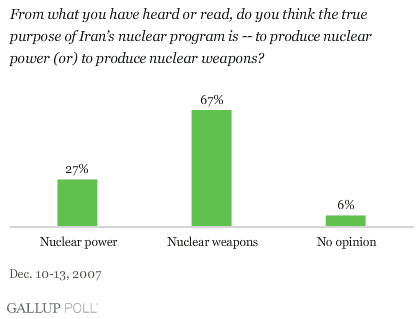
Party Affiliation
Republicans are much more likely than Democrats or independents to view Iran as the greatest threat to stability in the world, to think its nuclear program poses a threat to the United States, and to believe its nuclear program is designed to produce weapons.
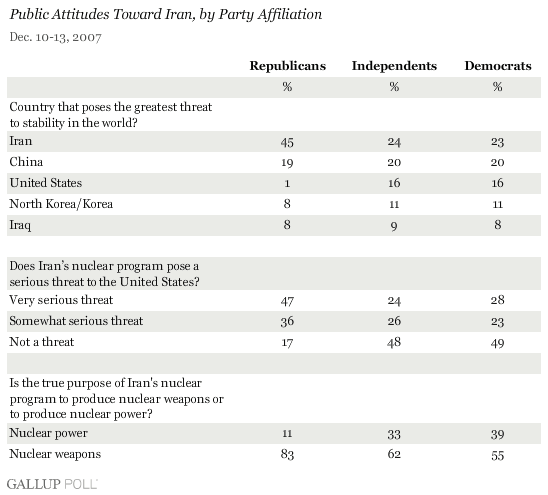
The highest percentages of Republicans, independents, and Democrats all mention Iran as the greatest threat to world stability, but Republicans are much more likely to do so. Democrats and independents are equally as likely to mention China as Iran. Democrats and independents are also substantially more likely than Republicans to say the United States is the greatest threat.
In terms of the threat generated by Iran's nuclear program, 83% of Republicans say it poses a threat to the United States, including nearly half (47%) who say a very serious threat. Democrats and independents are closely divided on this issue -- with about half saying the program poses a threat and half saying it does not.
An overwhelming 83% of Republicans say Iran is trying to produce nuclear weapons, while 62% of independents and 55% of Democrats share this view. Still, a majority of all three groups believe the ultimate goal of Iran's nuclear program is to build nuclear weapons.
Attention Paid to News About Iran's Nuclear Program
About one in four Americans say they are paying "a great deal" of attention to the news about Iran's nuclear program. This group is more likely than those paying a moderate amount of, little, or no attention to say Iran is the greatest threat to world stability and that Iran's nuclear program poses a threat to the United States. The vast majority of respondents, regardless of the amount of attention they are paying to the news about Iran, believe it is truly trying to develop nuclear weapons.
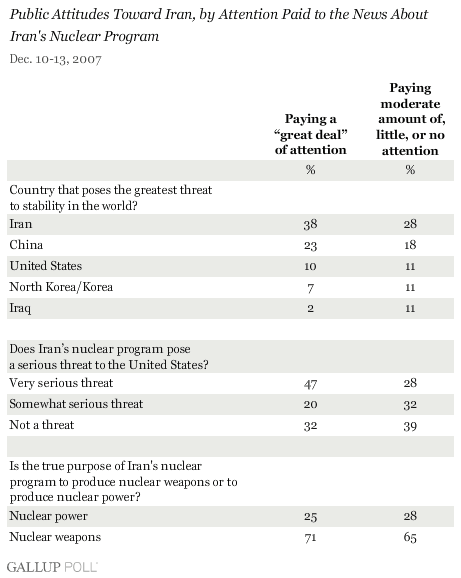
Americans paying a great deal of attention to Iran's nuclear program mention Iran as the greatest threat more often than those not paying as much attention to the story. Those not paying close attention mention Iraq as the greatest threat more often than those who have closely followed the story.
Nearly half of those paying close attention to the story (47%) say Iran's nuclear program poses a "very serious" threat, while this percentage is much lower, at 28%, among those not paying as much attention.
Survey Methods
Results for this panel study are based on telephone interviews with 1,008 national adults, aged 18 and older, conducted Dec. 10-13, 2007. Respondents were drawn from Gallup's household panel, which was originally recruited through random selection methods. The final sample is weighted so it is representative of U.S. adults nationwide. For results based on the total sample of national adults, one can say with 95% confidence that the maximum margin of sampling error is ôÝ4 percentage points. In addition to sampling error, question wording and practical difficulties in conducting surveys can introduce error or bias into the findings of public opinion polls.
